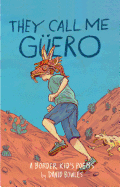
Twelve-year-old Güero is a "border kid, a foot on either bank." With copper-colored hair, "pasty white" skin and a ton of freckles, Güero has the lightest skin in his extended family. (Hence the nickname, Güero, literally, a "person with pale skin.") Everyone in the family has a loving nickname for him "[b]ut at school, it's a different story." He tells his "deep brown like mesquite bark"-skinned father about his classmate's taunts. "M'ijo, pale folks catch all the breaks/ here and in Mexico, too," his dad responds. "Doors will open for you that won't for me." Güero cries, frustrated: he didn't ask for this. No, you didn't, Dad says, "but now/ you've got to hold them open for us all."
David Bowles's (The Smoking Mirror) novel in verse is told entirely from Güero's seventh-grade point of view. Using poetic forms from different cultures--the Japanese haiku and chōka, the Malay pantoum, Korean sijo, Italian sonnet, French ballad--Güero invites the reader to experience his everyday joys and sorrows. He writes about his diverse group of best friends all named Bobby, whom his sister calls "los Derds--Diverse/Nerds"; he rhapsodizes about learning how to write poetry, and how he puts "pen to paper, and [his] soul/ comes rushing out in line after line"; he composes a number of senryu under the heading "Remedios y Rarezas" about he and "los Bobbys" comparing "all the strange beliefs/ [their] families share." With a glossary of Spanish words and phrases in the back, They Call Me Güero makes itself accessible to all readers, without ever moving away from celebrating and directly addressing Spanish-speaking children. --Siân Gaetano, children's and YA editor, Shelf Awareness

